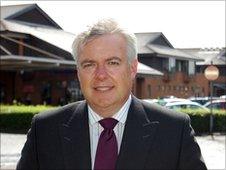Budget ignores Wales' needs, says Carwyn Jones
- Published
The severity of the cuts proposed in Tuesday's Budget risk tipping Wales back into recession, says First Minister Carwyn Jones.
He spoke after the assembly cabinet discussed how to cut an estimated £500m from its budget next year.
Mr Jones said Wales would be hit "disproportionately", but the impact would not be known until the autumn.
Welsh Secretary Cheryl Gillan has described the UK government's first Budget as "tough but fair".
Chancellor George Osborne announced an increase in VAT up to 20%, the freezing of child benefit and a rise in personal income tax allowance.
He also placed new limits on housing benefits claims and announced medical assessments for new and existing Disability Living Allowance claimants.
Early indications suggest that in real terms, Welsh ministers may have to manage cuts of around £2bn to their spending power over the next four years.

First Minister Carwyn Jones launched a bitter attack on the Budget
In an early response, the assembly government said ministers were "disappointed" Mr Osborne did not "recognise that Wales is already underfunded by £300m per year".
After Wednesday's special cabinet meeting, Mr Jones said the severity of the cuts proposed risked tipping Wales back into recession.
He said the true impact on the assembly government's budget would not be known until the autumn spending review.
And he launched an attack on Mr Osborne's speech, claiming the needs of Wales had been "ignored" in the Budget, pointing to "significant references" about Scotland and Northern Ireland.
Mr Jones also described the "respect agenda" between the UK government and devolved administrations championed by Prime Minister David Cameron as "tarnished" as a result of the chancellor's announcements.
He refused to be drawn on whether Wales would follow England in implementing a freeze on council tax, saying it was his understanding that there would be no new money for Welsh ministers to deliver this.
But he maintained that even despite the anticipated spending reductions, policies such as free prescriptions, free school breakfasts and the concessionary travel fares scheme remained priorities for his government.
In a statement after the meeting, business and budget minister Jane Hutt said there remained "a lot of uncertainty" about what the Welsh budget would be until 2014-15.
She said: "Based on the Office of Budget Responsibility's forecasts, the government's plans will hit the economy hard, reduce growth and increase unemployment.
"We are also concerned that the UK government has not demonstrated how it will encourage growth to help address the deficit and bring us fully out of recession.
Safeguarding support
"We need to take a longer-term approach in Wales which limits the impact on jobs and services, to provide stability and resilience for the future - a smaller public sector will not guarantee a larger private sector."
Mrs Gillan said the Budget set out a "balanced" package of measures which would help tackle the largest deficit in peacetime history, while safeguarding support for the poorest and most vulnerable in society.
She said thousands of businesses across Wales would benefit from the Budget, giving the example that a three-year scheme would exempt Welsh firms from up to £5,000 of employer National Insurance contributions for the first 10 employees hired.
Meanwhile, Mrs Gillan has been answering MPs' questions for the first time since the general election.
She told the House of Commons that she had asked the Electoral Commission to assess a proposed question for a referendum to give the assembly more law-making powers.
- Published22 June 2010
- Published22 June 2010